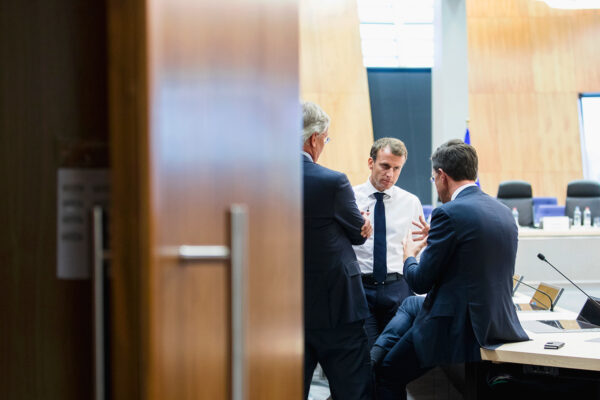
The European Commission has sided with the Netherlands and smaller nations against a Franco-German proposal for industrial policy.
The decision is a victory for Dutch prime minister Mark Rutte, who has formed a loose alliance of likeminded Central and Northern European member states to prevent a lurch to protectionism in a Europe without the UK.
Strategic autonomy
I wrote here a year ago that Emmanuel Macron’s quest for European “strategic autonomy” put him at odds with Rutte, a fellow liberal.
While Macron worried European companies could be crowded out by state-backed American and Chinese competitors, Rutte worried that firms from smaller countries like his could be crowded out by Franco-German monopolies. “Strategic autonomy” sounded like a smokescreen for old-fashioned French dirigisme.
The European Commission agrees. It can live with temporary state aid to help firms weather the effects of the coronavirus pandemic, but in a communication to other EU institutions it cautions against permanently weakening antitrust rules.
“Strong competition enforcement is fundamental for businesses and consumers to reap the full benefits of our single market,” argues European competition commissioner Margrethe Vestager, who belongs to the same liberal family as Macron and Rutte.
It gives businesses of all sizes a fair chance to compete. It makes sure businesses are challenged to deliver the best, most innovative solutions for consumers. And it gives customers a choice of products and services, contributing to reliable and diverse supply chains.
Industrial policy
When Vestager blocked a merger of the French and German train manufacturers Alstom and Siemens in 2019, German chancellor Angela Merkel joined Macron’s call for a European industrial policy.
The two leaders proposed to:
- Block unwanted foreign investments.
- Condition trade deals on reciprocity in public procurement.
- Relax competition rules to allow state aid and mergers.
- Subsidize innovation.
Macron also argued for adopting a European preference in public tenders and punishing foreign companies that don’t respect EU data-protection and environmental regulations.
Rutte and his allies, including the prime ministers of the Baltic and Scandinavian countries, Ireland, Portugal and Poland, countered with their own proposals, which ran in the opposite direction:
- Complete the single market in services.
- Remove barriers to labor mobility, including through mutual recognition of professional qualifications.
- Set global standards in artificial intelligence and the digital economy.
- Strengthen European capital markets to enable cross-border risk-sharing.
Spanish prime minister Pedro Sánchez, a social democrat, endorsed Rutte’s vision earlier this year. Italy leaned toward the Franco-German plan.
Rutte and Sánchez do share Macron’s analysis that Europe has become too dependent on American big tech and Chinese raw materials. They don’t rule out blocking foreign investment in key industries. And they are willing to make exceptions to the rules when it helps Europe transition to a greener economy.
Exemptions
So is the commission. It calls out batteries and hydrogen — also the examples given by Rutte and Sánchez — as innovations that could be exempt from competition rules in order to enable the European Green Deal.
In general, it would take a lenient view to state support for biodiversity, circular-economy initiatives and decarbonization.
Other exemptions highlight the difference in antitrust philosophy: where France and Germany hoped to create European “champions”, the commission puts the interests of European consumers first.
For example, it would allow state aid to bring high-speed internet to remote areas, where it may not be profitable for companies to roll out their network.
It also promises to review if competition rules hinder the interoperability of European rail.
Rutte’s victory
Rutte’s victory has gone almost unnoticed in the Netherlands. The left-leaning de Volkskrant understands that the commission has come down on the side of the Netherlands, but it doesn’t recognize the role Rutte’s diplomacy played. The only Dutch publication that does is the specialist Brusselse Nieuwe.
This is not unusual. Rutte’s biggest European successes have been things he stopped: a eurozone budget, European tax harmonization, eurobonds, a coronavirus recovery fund consisting entirely of grants. We can add nipping an EU industrial policy in the bud.
It has earned Rutte the nickname “Mr No” in Brussels, but somebody needs to say no to bad ideas.
